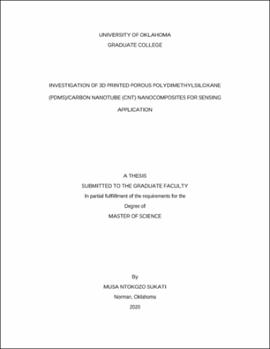| dc.description.abstract | Sensors manufactured using piezoresistive elastomeric nanocomposites have a wide range of applications in fields such as structural health monitoring, robotics and biomedical industries. These nanocomposites are a mixture of highly deformable polymers and conducting nanofillers that have the special property of experiencing a change in their electrical conductivity when compressed or stretched. The use of Additive Manufacturing processes such as Stereolithography Apparatus (SLA) and Direct Ink Writing (DIW) to construct sensors from these nanocomposites has provided numerous advantages including increased sensitivity of the sensors and the fabrication of complex geometry. However, bulk material sensors, manufactured additively or using conventional methods, display a greater effect of hysteresis, especially at strains higher than 10%, which limits their sensitivity. In order to address this challenge, this thesis focuses on the use of porosity in the form of varying infill densities and patterns made possible by Additive Manufacturing processes to significantly reduce these bulk material effects.
The additive manufacturing of porous structures requires the nanocomposite material to hold its shape well after extrusion, and it should keep its shape when subsequent layers of material are deposited above it. Pristine polymers such as polydimethylsiloxane (PDMS) have no yield point which is a signifier of material that can hold its shape, therefore they cannot be successfully 3D printed while freestanding since they collapse and spread after extrusion. A thixotropic silica filler and carbon nanotubes (CNTs) were used to allow the material to hold shape and have a significantly higher yield stress required for porous structures to successfully print. Peak hold and amplitude sweep tests were conducted on nanomaterial consisting of 1.5% CNT and silica content ranging from 5-20% in order to quantify the rheological properties of the material. While all the silica content percentages had yield points and could hold shape during 3D printing, the material
formulation containing 15% silica was selected as the ideal material due to its high yield point and low brittleness.
Cuboids were 3D printed from this material using three infill patterns, three infill densities and two syringe needle sizes. The fabricated samples are characterized using a scanning electron microscope (SEM) to validate the microstructural features, layer bonding and infill densities. Each sensor’s pressure sensing capability is investigated using cyclic compression loading at various maximum strains. Sensing experiments show an increase in both stress and strain sensitivity, as well as a decrease in the mechanical and electrical hysteresis with the introduction of porosity. These results indicate that introducing porosity using 3D printing is a sensible strategy to improve the piezoresistive performance of nanocomposites and to allow for the tunability of sensing capacity in pressure sensors.
The mechanical performance of the sensors was analyzed along with tensile samples of the same infill patterns and densities. The fracture stress was determined and the locations of failure were analyzed. Finite Element Analysis was used to analyze the stress distribution within the material as well as to predict the location of failure. Mechanical results show a significant increase in the fracture stress of the porous compression samples above 40% infill density, therefore highlighting their durability and robustness. Results also show a reduction in the fracture stress for tension samples, highlighting their weakness under tensile loads. | en_US |
